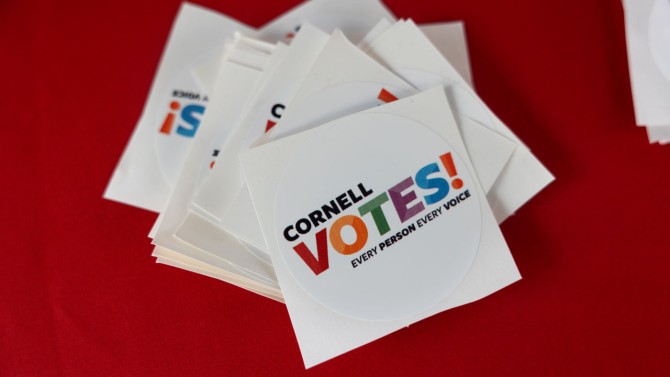
The nonpartisan student group Cornell Votes tables at Welcome Students Weekend, Sept. 14, on the Ithaca Commons.
Cornell Votes fields a surge of student interest in voting
By Caitlin Hayes, Cornell Chronicle
More inquiries, more events, more forms, more excitement – the nonpartisan student group Cornell Votes is working overtime to register students to vote in the U.S. elections on Nov. 5.
“Already, you can tell that students are much more interested in voting,” said Camille Simmons ’25, president of Cornell Votes and a student in the Charles H. Dyson School of Applied Economics and Management. “They’re learning more, they’re talking about it more, asking more questions. We’ve also had more faculty reach out to invite us to their classes, and more student groups reach out as well.”
Cornell Votes, a group of around 100 students committed to increasing participation in all elections, aims to reach 90% participation for eligible students and continue an upward trend in voter turnout, from 47.4% of Cornell students voting in 2016 to 66.1% in 2020. In the first three weeks of the semester, the group has engaged with more than 1,500 students and personally delivered more than 30 registration and absentee ballot request forms to the Ithaca Board of Elections.
“We genuinely want every person to be able to voice their opinion, to engage with the issues and to be able to say that they’re actually participating, making a difference and doing their civic duty,” Simmons said.
The group’s goal is to make registering to vote and finding information as easy as possible for students, many of whom have never voted in a presidential election. To meet that goal, Simmons said their members are currently ubiquitous: tabling at events, visiting classes, sharing resources online, holding office hours and networking with a large coalition of both political and nonpolitical student organizations. The group, which is supported by the David M. Einhorn Center for Community Engagement, is also offering 30-minute Voter Ambassador trainings for anyone on campus to learn how to assist students in registering to vote; they’ve seen an increase in interest in that program as well, with 16 students trained already and another 30 scheduled for upcoming sessions.
For National Voter Registration Day on Sept. 17, the group will table in the lobby of Mann Library from 8 a.m. to 10 p.m. Voter Ambassador trainings will be held twice a month on Thursdays, beginning Sept. 19, and by demand. For students who don’t run into the group at an event on campus, Simmons recommends visiting the Cornell Votes Instagram page or website, and emailing them directly with questions. Office Hours are also held by executive board members Mondays through Thursdays at the Einhorn Center in Kennedy Hall.
“We’ll have a student who thinks they may have preregistered in high school but isn’t sure, or someone who doesn’t know what the rules are in their state for absentee ballots,” Simmons said. “We will personally do the research and send them whatever they need.”
Students can register to vote in Ithaca. Cornell Votes can direct students to the online registration or provide a hardcopy form that the group can send; New York registration forms and a locked mailbox can also be found in the Einhorn Center. For New York residents who want to vote in their home county, the group can help request mail-in ballots. The registration deadline in New York is Oct. 26, and registration applications sent by mail must be postmarked by Oct. 21.
For out-of-state students who want to vote in their hometown, Cornell Votes can help students find state registration deadlines, register in their home state and request and mail an absentee ballot. Data from 2020 reported that the majority of Cornell students voted out-of-state.
“We don’t get into any kind of blue versus red, Electoral College discussion – it’s just, “Where do you want to vote?’” said Simmons, who emphasized that Cornell Votes is fully nonpartisan. “When acting on behalf of Cornell Votes, members do not discuss politicians, policies or anything on the ballot. We’ll pull up students’ Board of Elections website for their town and walk them through how to register.”
In many states, students can register online, but Cornell Votes provides postage for hardcopy registration forms and absentee and mail-in ballots. The group will even help students fill in their dorm addresses, which Simmons said can be “funky.”
Simmons said the increase in workload for Cornell Votes will be worth it if more students participate.
“There are so many ways that elections impact people’s lives,” said Simmons, who has voted in every election she’s eligible for but who will be voting in a presidential election for the first time. “We don’t care what students put on their ballots. We just want them to fill out a ballot. We want them to vote.”
Students can find more information at Cornell’s voting website and vote.org.
Media Contact
Get Cornell news delivered right to your inbox.
Subscribe

